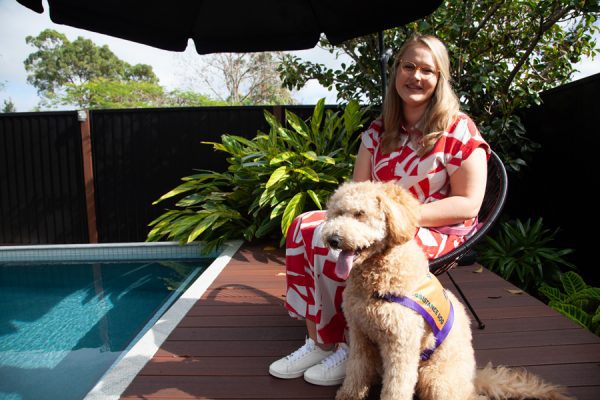Natascha has new lease on life thanks to Evy the labradoodle

Evy is always by Natascha’s side.
For those of us with canine companions in our lives, we know how much joy they bring us.
But for 25-year-old Natascha Kamp, who has a Functional Neurological Disorder (FND), having an assistance dog has been life changing.
Evy, a 15-month-old labradoodle, has undertaken advanced training to sense and alert to emotional and metabolic changes helping Natascha into remission. Now Evy can monitor her stress and fatigue to prevent seizures so she can live a much healthier, happier life.
“When Evy first came home with me as a 10 week old puppy, I was dissociating 90% of the time and experiencing up to 100 seizures a day. This was very painful, distressing and exhausting. Within one week of having Evy, my dissociation dropped by 50%,” Natascha said.
“Evy doesn’t just alert to symptoms, she also engages in distraction and blocking strategies.”
Natascha started as a patient at The Prince Charles Hospital and is now a representative on our Consumer Engagement Network.
“We are a group of people with lived experience of hospital services either as patients, carers or relatives. We provide feedback to management to improve the patient experience,” she said.
When Natascha visits the hospital, Evy comes with her, and she says it’s important for more people to understand the role of assistance dogs.
“Unlike therapy dogs, assistance dogs are allowed in public places, including hospitals, restaurants, stores, and public transportation as long as they are clean and behaving appropriately.”
If you see someone with an assistance dog across Metro North facilities, it is important to remember etiquette around assistance dogs:
- You can’t pet them or distract them, as they have important work to do to keep their owners safe!
- Welcome our assistance dogs in our hospitals – they will be wearing a vest to help you identify that they are working.
- Always ask the handler before approaching or interacting with an assistance dog
- Respect the handler’s privacy and avoid asking intrusive questions about their disability.
- Don’t photograph or video assistance dogs without permission from the handler. This can invade the handler’s privacy and distract the dog.
- Don’t block the path of an assistance dog and handler. Always give them the right of way to ensure they can move safely and efficiently.
